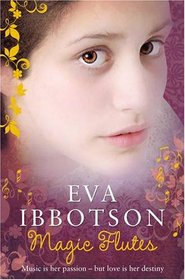I just recently started reading Eve Ibbotson, and this is the second one I've tried, after "The Morning Gift". "Magic Flutes" is much lighter than "The Morning Gift", set in an earlier(just post-World War I) era. I adored this book, not least because of the way it evoked the whole atmosphere of Vienna and Austria so well. I'm not sure that someone who has no inkling of the language, the food, the music, the people, and the city itself, as well as the Austrian countryside, could appreciate it as much. Maybe they would want to skip over all that detail, but to me, I ate up every page with a spoon, and then licked the bowl.
That being said, there was so much else about this book to love. The characters were delightful. Tessa, the heroine, is a princess with a rundown old castle, no money, and her only remaining family are two elderly aunts. But that's OK because she rejects the idea of the aristocracy, and she's happiest working as a backstage assistant and all around drudge and gofer, at a 2nd tier opera company. She is simply adorable, and everyone-stagehands, dogs, children, servants-love her. The hero, Guy, is a very wealthy, ambitious self-made man, who just happens to be in the market for a castle, mainly to impress his gorgeous, but shallow and snobbish fiance. Guy was a foundling, and the most endearing thing about him is the sincere affection between him and the foster mother who raised him. And it's that relationship that tells the reader that Guy really is capable of true unselfish love, and deserving of the heroine. They are obviously meant for one another, but first there are obstacles to overcome. Their romance is poignant, but never too sad, which would have caused the story to lose its magical fairy-tale flavor.
"Magic Flutes" just sparkled with subtle humor, a lot of it coming from the opera company, which is full of colorful characters. And when the opera company travels to the castle for a performance, there are more colorful characters, a whole collection of down-and-out aristocrats, made obsolete by the 20th century.
If you like sweet romance with humor, you should love this book. It's wittier and more sophisticated than Betty Neels, but kinder and not as sarcastic as Georgette Heyer in its depiction of human frailties.
The last few chapters, when the H and h finally get their HEA, but not until after a final misunderstanding, was so wonderful that I read it twice in a row. I can see this being a great comfort read, to revisit again and again.
That being said, there was so much else about this book to love. The characters were delightful. Tessa, the heroine, is a princess with a rundown old castle, no money, and her only remaining family are two elderly aunts. But that's OK because she rejects the idea of the aristocracy, and she's happiest working as a backstage assistant and all around drudge and gofer, at a 2nd tier opera company. She is simply adorable, and everyone-stagehands, dogs, children, servants-love her. The hero, Guy, is a very wealthy, ambitious self-made man, who just happens to be in the market for a castle, mainly to impress his gorgeous, but shallow and snobbish fiance. Guy was a foundling, and the most endearing thing about him is the sincere affection between him and the foster mother who raised him. And it's that relationship that tells the reader that Guy really is capable of true unselfish love, and deserving of the heroine. They are obviously meant for one another, but first there are obstacles to overcome. Their romance is poignant, but never too sad, which would have caused the story to lose its magical fairy-tale flavor.
"Magic Flutes" just sparkled with subtle humor, a lot of it coming from the opera company, which is full of colorful characters. And when the opera company travels to the castle for a performance, there are more colorful characters, a whole collection of down-and-out aristocrats, made obsolete by the 20th century.
If you like sweet romance with humor, you should love this book. It's wittier and more sophisticated than Betty Neels, but kinder and not as sarcastic as Georgette Heyer in its depiction of human frailties.
The last few chapters, when the H and h finally get their HEA, but not until after a final misunderstanding, was so wonderful that I read it twice in a row. I can see this being a great comfort read, to revisit again and again.




